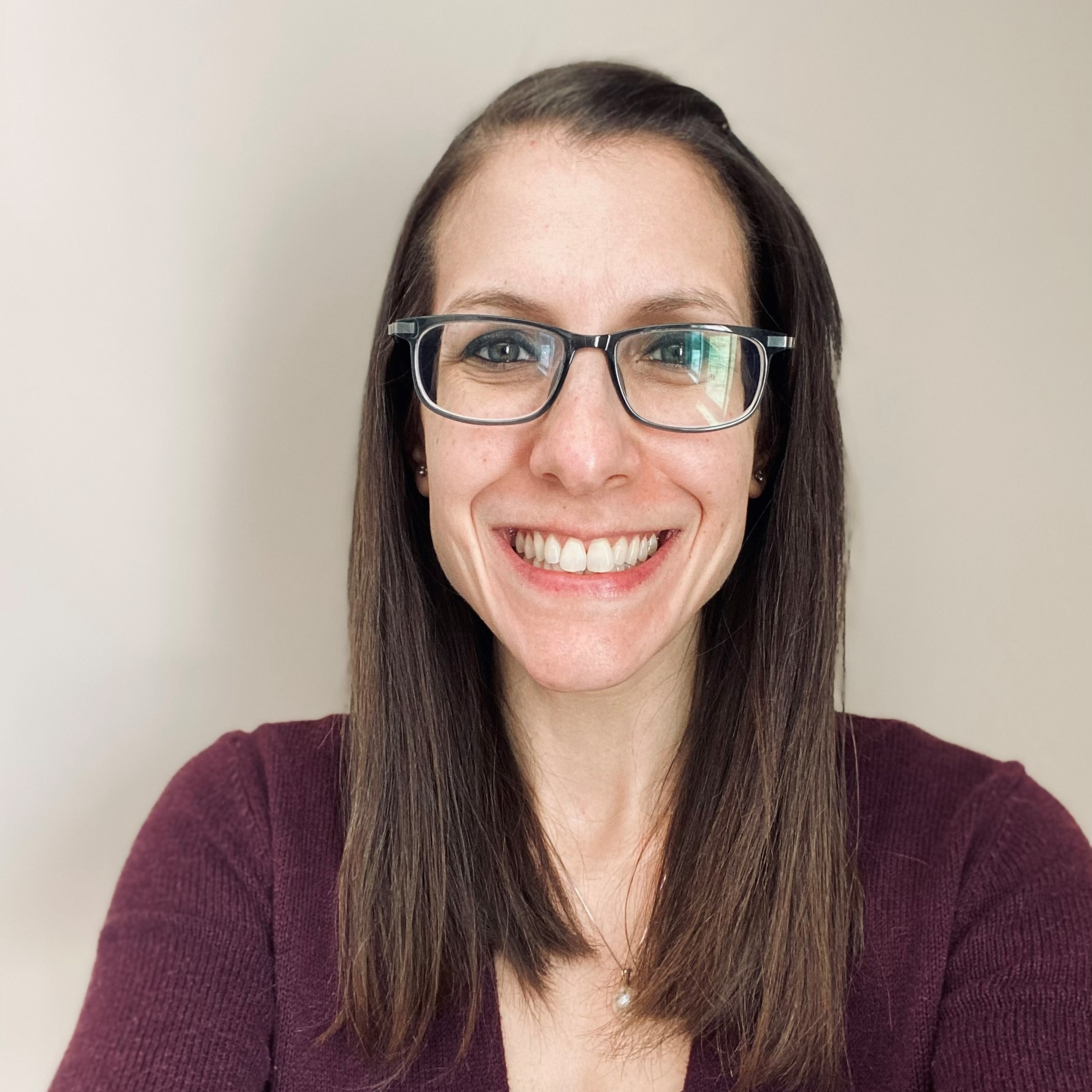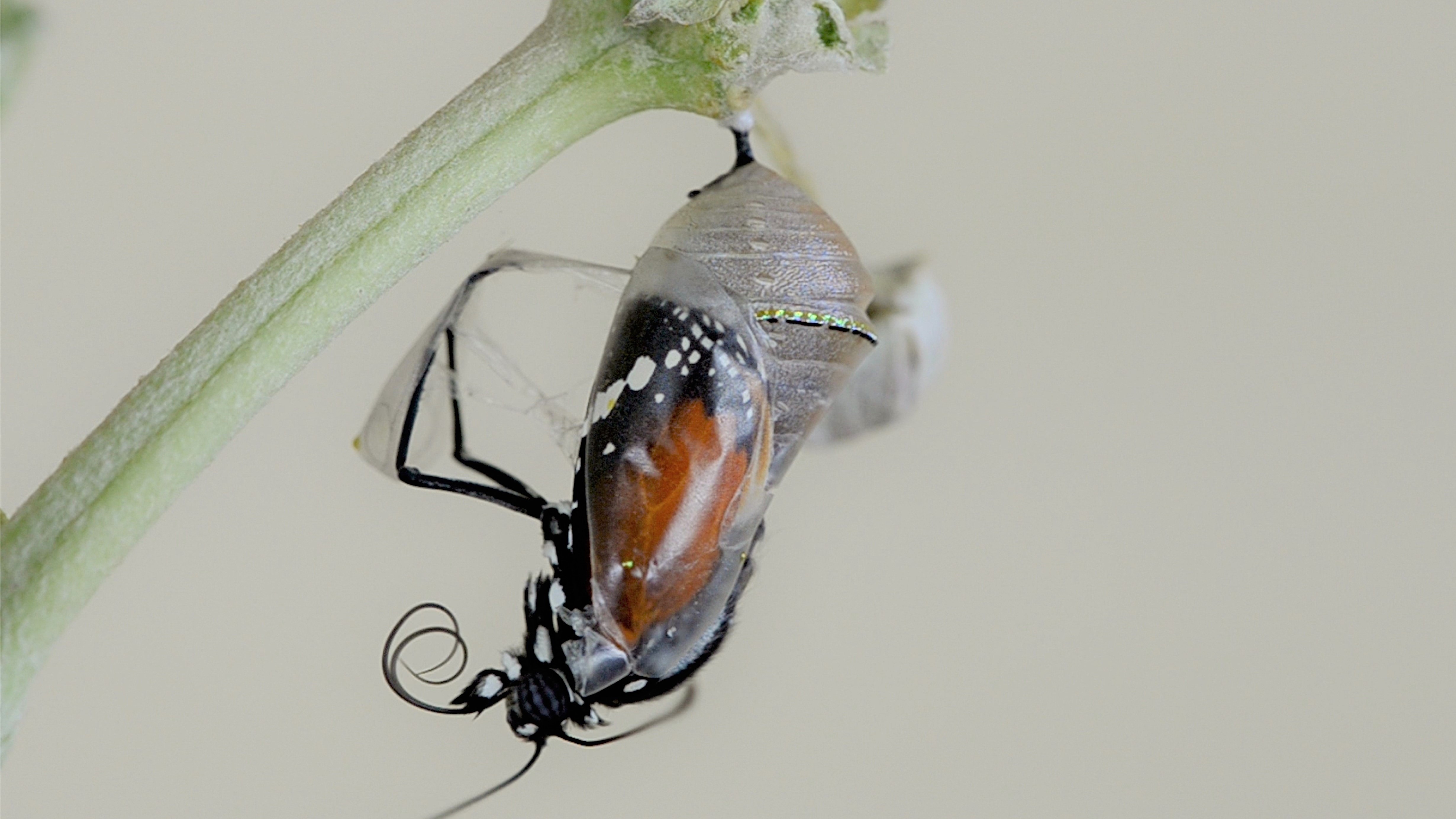I first got to know Tamarack in 2015, supporting partnerships to improve educational outcomes in Utah. Tamarack sparked thinking and action on how to center students and families with lived experiences of poverty and racism in reimagining K-12 education. The tools were practical and abundant. The stories prompted new ways of thinking. The invitations to act were focused and systems oriented.
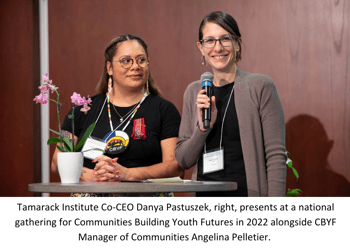 Tamarack has shaped how I center lived experience in my work for change, and it was an honour to join Tamarack as Co-CEO beside Liz Weaver in February 2022, as successor to Paul Born, who co-founded Tamarack with Alan Broadbent two decades ago.
Tamarack has shaped how I center lived experience in my work for change, and it was an honour to join Tamarack as Co-CEO beside Liz Weaver in February 2022, as successor to Paul Born, who co-founded Tamarack with Alan Broadbent two decades ago.
Over the past year, I’ve often been asked what I’m learning. (This is one of the gifts of people who think about place, community, systems, and equity – their delight in learning.)
When I think about what I’ve learned, I think about the roles I’ve held. A person in a complex system. A co-leader of an innovative, two-decades old organization designed to support justice at a massive scale. And a member of a network that has been internationally recognized for collective social change. The roles I hold offer me a frame for what I’m learning.
My hope is that sharing them will spark insights for others, particularly those of you who are taking up new roles or considering doing so. (You should. Your unique set of passions and gifts will be a huge asset.)
A Person in a System: Showing Up Fully
Our identities shape our experiences, so I’ll start by sharing some of my identities. I am a white settler, Jewish, able-bodied, 42-year-old woman, raised in the US and now eight years into residency in Canada. My ancestors are from Poland and Ukraine, and my remaining family is quite small. I’m a mother, wife, sister, friend, and daughter, and I find a lot of peace in running, cycling, exploring music, and doing puzzles with my husband and young boys.
Like many of you, I know that we can end poverty if we accept that poverty is created by and persists because of economic, social, and cultural systems that create advantages for some groups and disadvantages for others. If we acknowledge that, in the words of Campaign 2000’s Leila Sarangi, “poverty is a policy choice."
In my role as a human holding these identities, here’s some of what I’ve learned.
Love who you are.
When I was a child, my mother said this constantly. She told me that I’d been born into a culture that would reward “perfection.” And she told me that striving for perfection leads to self-critique and people pleasing.
Last summer, I met De’Amon Harges. A community organizer, entrepreneur, and faculty at the Asset-Based Community Development Institute. De’Amon tells stories of creating spaces where people discover their gifts, passions, and dreams. Something in his frame helped me hear my mother’s advice in a new way. By getting to know the work in Indianapolis, Lakeside Harbor, Edmonton, and Nova Scotia, I’m reminded that change work starts with loving yourself and your unique gifts. This past year, I tried to remember to calm my critical voice, to care for myself through rest, food, movement, art, and social connections, and to dampen the voices that didn’t offer love.
Develop a reflective practice.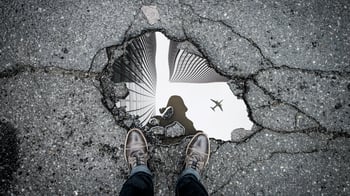
It can take time to figure out how to use our agency - as limited as it may be at times - in ways that advance the results we want. Having a reflective practice has helped me see and question the mental models that shape the possibilities that I see, the options that I consider, my thoughts, and my actions. Reflecting encourages me to sit with the impacts of my past decisions and to decide how I want to be in the future.
My reflective practice also helps me to see the larger systems that I’m a part of. This winter, I got to know Marianne Cerilli. She helped me see that, while many things have uncertain outcomes, we can often imagine our present situations to their logical conclusions. Climate events, for example, will continue to precipitate fractures in our global, connected economies. Targeting interventions toward some, for example, will continue to create benefits for all. Regularly reflecting has helped me to see the transformations that our current systems must undergo if we seek justice.
For more than a decade, I’ve worked with groups to use feedback and other types of data to improve strategies pointed at health and education outcomes. This year, I remembered that spacious personal reflection fuels a personal improvement process that enables me to better see both self and system.
Seek out contradictory perspectives.
This past year, I’ve relearned the value of hearing feedback with openness and gratitude, owning unintended impacts, and sharing what I’ll change. I’ve become more aware of where I am part of systems that uphold injustice and when I tend to exhibit characteristics of White Supremacist Culture. (For me, this looks most often like staying silent when I should say something, even if what I say comes out a bit awkward.)
While a personal reflective practice helps, I've learned that I also need trusted relationships with people who will ask me questions about my choices and tell me about the impact I’ve had.
Power means responsibility.
Last Fall, I participated with 14 other women in the inaugural cohort of Saralyn Hodgkin and Surabi Jain’s Women in Power. Some of the most impactful conversations were on power. We all have power. When we have power related to our titles, social networks, ability to enact rewards especially, we also have the responsibility to offer perspectives that are in service of what is just. When we support people, teams, or networks (and when we have platforms and an audience), we have an obligation to call on people when they’ve caused harm because of what they’ve done (or not done).
I think this is particularly true for white people who are in relationship with each other. We must be honest with one another about the impacts of what we say and do (or don’t say and don’t do). This is one way we can stand beside the racialized people in our lives and work toward racial equity.
A Co-Leader in A 20-Year-Old Organization
At Tamarack, we know that we have all contributed to our current reality; therefore, we have a role to play in remaking it. We know that people with lived and living experience must be central in every aspect of change work. We are learning and making mistakes, but we are wholly committed in every part of our work. Here’s what I’ve learned about being a Co-CEO in a well-established and impactful organization.
The first work is people work.
When I joined Tamarack, the people around me welcomed me well with a virtual dance party on my first day! They encouraged me to focus first on understanding the result we’re after, our unique contributions, and the roles of others in our ecosystems. They encouraged me to meet people and soak up new knowledge. And yet I put pressure on myself to create. I took on the “doing” too soon, and in the future, I will commit to making more time to understand the people, history, and landscape before diving into action.
Hold what’s been and what will be.
Tamarack has supported hundreds of communities to design, implement, iterate, and sustain plans to end poverty and other related issues. We've contributed to the evidence that multi-sector, community-led, outcomes-focused collaboratives can address complex issues and been internationally recognized for this work. There’s so much that’s working well. It should be understood, nurtured, and celebrated.
And yet as an organization and as a network, Tamarack is also part of systems that created and are maintaining income inequality, social isolation, and climate changes that result in life-ending fires, droughts, and hurricanes.
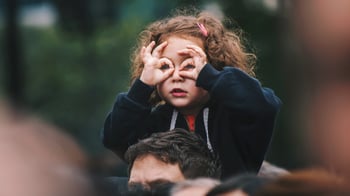 New leaders bring what my colleagues have called “fresh eyes” and have an opportunity to see and seize new opportunities.
New leaders bring what my colleagues have called “fresh eyes” and have an opportunity to see and seize new opportunities.
I learned this year that there’s a tension in honouring what’s been and in moving toward what could be. I was reminded of the value of knowing what’s been and who made it that way. I learned the importance of marveling out loud about what’s working. I’ve been reminded of the wisdom that people who have seeded and cared for an effort bring. I've re-learned the importance of starting with why, when you’re making a change or asking for something new. I am grateful to everyone else who is offering wisdom and perspective on Tamarack’s first twenty years.
Process work is equity work and inclusion work.
Activating a shared vision is adaptative work. Every once in a while, we encounter things that can be laid out in a clear policy or process. I was reminded this year that it is helpful to visualize them or write down these infrequent things. This creates more space for work that’s relational, disputed, and prone to shift as new realities emerge. Process matters to think, learn and pattern together. Process matters to get to aligned, meaningful action.
What’s more, creating processes with the people who will be impacted by them is a means of shifting power and centering their experiences.
We spent time this year clarifying processes that I hope will help us retain, advance, and celebrate team members; distribute authority over budgets and workplans across a larger number of people; and activate – in the words of Marcus Littles – “a courageous process for collective decision-making.”
Process work can support inclusion, and it can support equitable outcomes. In Tamarack’s context, process work IS the work of centering people with lived and living experience of the systems that need to change. For those of us who build the containers for collaborative work, process work IS the work of change at scale.
Build trust through authenticity.
I know we can end poverty in Canada in ways that honor people, place and planet. I am committed to doing what I say I’ll do with transparency. I’m committed to disrupting the norm of top-down decision-making. I’m curious and analytical. I love people. I’m aware of the human tendency to “other,” and try to connect with people who I perceive as different from me.
And there are a lot of things that I’m not, and that’s okay too. The beauty of collaborative work is that when we each bring our gifts, we create a collection that is - in its sum - beautifully complete.
I'm learning that when I show up as the person that I am and with curiosity and respect for what other people are and are becoming – that these are ways of being that are in our roots as humans. These are manifestations of loving yourself, and these are the conditions for trust.
Seek relationships, results, and roles.
Results Based Leadership helps me contribute to human-centered, equitable outcomes and systems. Over a decade ago, Results-Based Leadership offered me language to see how people (who have roles and experiences and theories and skills), places, and structures interact.
Brought to life by many knowledgeable coaches and mentors, Results Based Leadership changed how I think about relationships between people and systems. As I shared above, it’s also helped me to focus, by reminding me to be thoughtful about and committed to my most critical roles in a given context.
Relationships between people matter. This past year, so many partners and teammates have reminded me about the joy, learning, rest, and community that comes from taking time daily for lunch, tea, impromptu calls, walks, and the exchange of memes.
Relationships between people and systems matter too. As I’m learning a new role, I’m also relearning how my ways of being impact others. I’m learning that moves that might seem small to me have big impact. I’ve identified mental models and behaviours that I need to shift, to have my work line up with my intended impacts.
I’ve learned that relationships between people in their various roles are strengthened when I know the results people seek, the contributions they want to make, and the ways that their contributions and mine interact. As Co-CEOs, Liz and I unpacked Tamarack’s goals, principles and strategies (with support from Jeff and Pablo at the ally co). We affirmed Tamarack’s core result – to end poverty in Canada in ways that honour people, partnerships, place, and planet. We invited our teams to identify the unique ways they contribute as teams and as people to Tamarack’s result. We’ve revisited this a few times, pressure testing if we’re (in Liz’s words) “hive mind" on what we want and our theory of how to get there. We’ve worked (and will continue to work) to make sure our answers reflect what we are hearing from the Tamarack network.
And because our world is changing rapidly, and new opportunities to walk toward justice are emerging, our alignment conversations will be ongoing.
A member of a 45,000-Person Strong Network
One of my other roles is as a member of an amazing network that stretches coast to coast to coast. Here’s some of what I learned this year.
Accept and embrace the short cast of the light.
Hannukah is one of several dozen religious observances that falls around the winter solstice. The celebration remembers a time when a dish of oil that should have lit a candelabra for one night lasted for eight. In December 2022, Hannukah reminded me that there is often a bit of light, even when things are mostly dark. It reminded me that one night’s worth of oil can last eight – that things worthy of awe happen every day. Our most immediate ordeals can be overwhelming, but we can make the choice to design toward what’s just and fair. (This is particularly true for someone like me, who has privileges that insulate me from harm.) The alternatives may lead us to reclusiveness and othering.
I’ve learned this past year that important learning and action comes from entering and staying in conversations about “what if,” “why not” and “what’s possible.” I’ve learned this past year the power of learning and amplifying communities’ successes, so that they can inspire and scale. I’ve deepened learning about the importance of seeing and celebrating the daily signals of progress on the way to justice at the scale we need.
We’re all under the same sky.
In “Sum of Us,” Heather McGhee’s data and stories show the cost of racism. She debunks the idea that progress for some must come at the expense of others. She defines the Solidarity Dividend as the gains that come when people come together across race and culture to accomplish what no one of us could do on our own.
At Tamarack, I co-convene a partnership focused on financial inclusion for the working poor. (Those words are ones that the partners – employees at a financial institution, people with lived experience of poverty, and employees at financial inclusion focused non-profits – selected together.) Our work is to recommend policies and products to be used in bank branches to enable financial mobility for people impacted by poverty. The day-to-day work is about understanding the history that’s led us to wealth inequality, and it’s about understanding each other’s experiences of the banking system.
The work has been a powerful reminder that we are all connected. Ending poverty in all of its forms benefits all of us. We can’t do that if we don’t come together across sectors, communities, political affiliations, and identities to support the Truth and Reconciliation Commission of Canada: Calls to Action and other calls to action put forward by equity-deserving groups, and to achieve the promises that have been made to do things like dramatically reduce poverty and end child poverty in Canada.
Our narratives shape our work.
In Portage la Prairie, Manitoba, there is a building with a mural that I think about a lot. It shows the love that a young person in Portage has for their home. It shows the talent that young people have to offer us. It shows us the assets of this beautiful part of the world.
As I explore about the interconnections between poverty, climate change, belonging, racial equity, education equity, and reconciliation, I join others in the belief that the solutions to these issues center on seeing each other’s humanity. And I join others in the realization that we can help each other see one another’s humanity if we share what’s true. Poverty is a solvable problem. Connections and collaborations grow our capacity to make a difference. All places are beautiful, and they matter. People most impacted by the problems we face make essential contributions to every phase of our change work.
We have the opportunity to name and to challenge the narratives that don’t serve justice, and to offer new ones that do. If we can do that together, across people, organizations, partnerships and movements, we can begin to shift collective consciousness.
Much media focuses on division and calamity, and this shapes how we see one another. We are in tumultuous times, but every day is rich with opportunities to impact the people and issues that matter to us. Regularly reflecting on how we want to be and what we want to contribute helps us learn. It is also key to using our gifts and passions to get to results.
I’ve learned so much this year about self-care inner work, relationship building, process building, and the beauty of holding the tensions between seemingly incompatible things. I’ve learned more about the importance of sitting with “why not?” and “what if?” I’ve learned more about the power of the stories we tell and who tells them. I’m eager to see what learnings are ahead.
To all who are embarking on or considering new roles, know that you can do it. And thank you to everyone who brings their unique passions and gifts to the work of justice. I’d be grateful to know what you are learning about how to hold your roles in ways that move you toward your dreams for this world. Please reach out.
Thank you to Astrid Arumae, Marianne Cerilli, Jessica Gilligan, Alison Homer, Mike Des Jardins, and Connor Judge, and Liz Weaver for their review of this piece, which I wrote on the traditional and unceded territory of the Anishinaabe Algonquin People, working to demonstrate an ongoing commitment to reconciliation.
